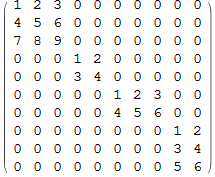a = {{1, 2, 3}, {4, 5, 6}, {7, 8, 9}};
b = {{1, 2}, {3, 4}};
ArrayFlatten[{{a, 0}, {0, b}}] // MatrixForm

You can Fold this operation over a list of matrices to get a diagonal:
a = {{1, 2, 3}, {4, 5, 6}, {7, 8, 9}};
b = {{1, 2}, {3, 4}};
c = {{1, 2, 3}, {4, 5, 6}};
d = {{1, 2}, {3, 4}, {5, 6}};
Fold[ArrayFlatten[{{#, 0}, {0, #2}}] &, a, {b, c, d}] // MatrixForm

Here is another way to do this, illustrating a forcing of DiagonalMatrix by using an arbitrary head (Hold) on top of List:
DiagonalMatrix[Hold /@ {a, b, c, d}] // ReleaseHold // ArrayFlatten // MatrixForm
(same output)
Or a bit more cleanly using Unevaluated (though this may be harder to apply in a program as opposed to interactive input because the elements of your matrix list will probably not be named):
DiagonalMatrix[Unevaluated @ {a, b, c, d}] // ArrayFlatten // MatrixForm
(same output)
